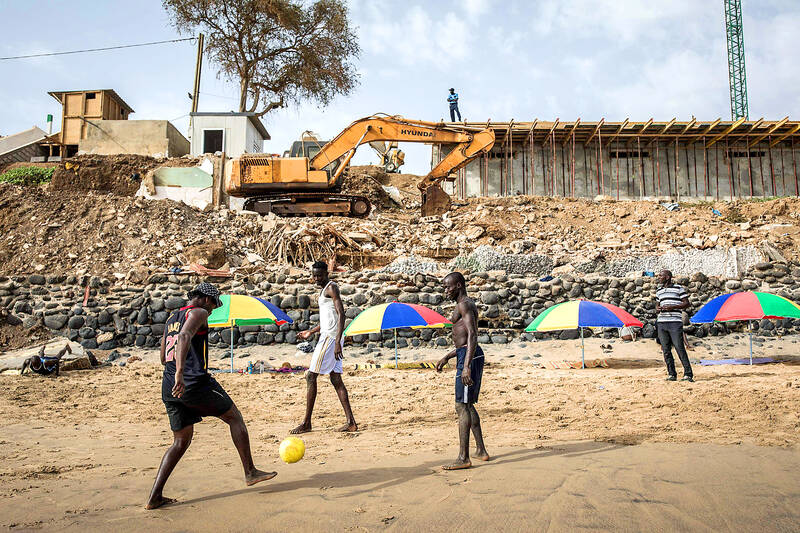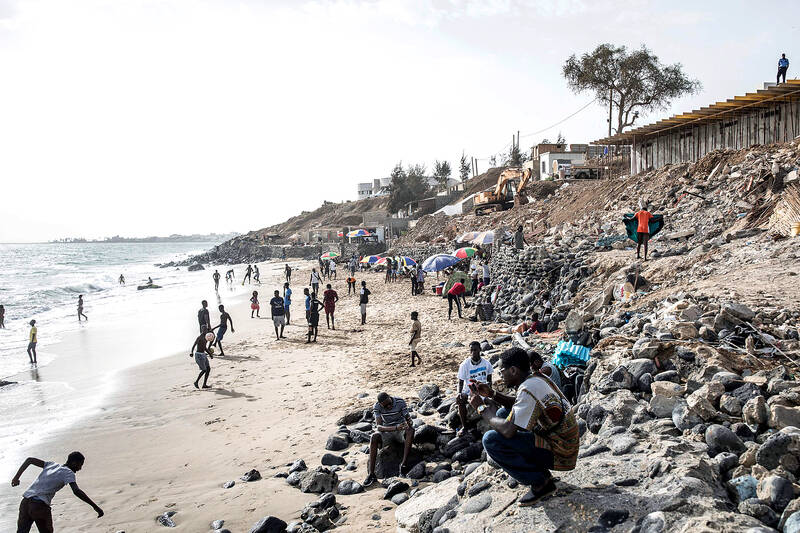Ibrahima Bathily said that he no longer recognizes the beachfront in the area of Senegal’s capital, Dakar, where he grew up.
“The entire coast is privatized. It has become impossible to access the sea without paying,” Bathily said.
Buildings have sprung up on all sides of his makeshift bar that stands on rocks facing the Atlantic Ocean.

Photo: AFP
Even the 100m beachfront strip that is state-owned and prohibited from being built on has not escaped.
Just a few years ago, bathers thronged the area, enjoying a cool dip in the waves overlooked by the city’s emblematic Mamelles twin hills.
However, Dakar has undergone voracious building work. Home to about one-quarter of Senegal’s population and its economic hub, the number of Dakar residents swells by 3 percent every year.

Photo: AFP
As the capital of a west African nation renowned as stable in a troubled region, the city also draws many foreigners.
Construction sites are everywhere, real-estate prices are soaring and the coastline is disappearing under a sea of concrete.
“It’s incredibly fast. You wake up one day and you find a building somewhere,” Bathily said.
He said he has been approached several times to give up his bar in return for money. Such an offer can be tough to turn down when the median wage was 54,000 CFA francs (US$89.01) a month in 2017.
All around the peninsula on which Dakar is built, beaches have been nibbled back to a bare minimum.
Locals are despondent about the loss of access due to the arrival of luxury hotels, villas or clinics, as well as over how it has all been allowed to happen.
However, despite public exasperation, “we are unable to truly unite energy and forces,” said Oumar Diagne, of the SOS Littoral non-governmental organization.
Building screeched to a halt at the end of April after Senegal’s newly elected leaders took over, pledging integrity and transparency.
They ordered a two-month suspension of all construction on the strip that remains in the state’s hands to verify the legality of occupancy rights.
The outcome is eagerly awaited, Bathily said.
However, records in the land registry are notoriously difficult to decipher despite them now being online.
The vast financial sums at stake also feed suspicions of widescale money laundering.
“Real estate is a sector that is particularly targeted by money launderers” whether for drug trafficking, illegal migration or corruption, a Senegalese Ministry of Finance unit tasked with fighting money laundering and financing of terrorism said.
“Senegal is no exception,” it said, mentioning only “inspections” when describing what action it takes.
Many buildings do have the proper deeds.
Mamadou Diangar, a public law researcher, said that authorities can permit building to go ahead by delisting a spot on the strip.
Lawmakers did not set “precise criteria” for the delisting of a building, leaving the law open to interpretation, Diangar said.
Senegalese Prime Minister Ousmane Sonko promised while still in opposition that he would ensure all illegally constructed buildings were pulled down.
However, that could prove “legally very complicated and costly, because these are not small investments,” Diangar said.
“Is the budget of the Senegalese state able to bear this compensation?” he asked.
“It will need strong political choices,” he added.
Sonko chose a Dakar beach with a building site backdrop when he pledged to crack down on offenders in 2020.
Those projects are now complete, with several-story-high luxury buildings blotting out a stretch of the old beach.
Not far away, the cabin of former fisherman Bathie Faye has survived.
Considered a temporary structure, it is authorized to be on the strip where Faye earns a living providing services to those using what is left of the beach, but he fears the demand for beachfront real estate means it is only a matter of time before he is made to move on.
It would not be the first time. During the administration of former Senegalese president Abdoulaye Wade, who also vowed to combat rampant building, police turned up one day and dismantled Faye’s previous cabin ahead of the start of construction work.
“You can’t fight people who are stronger than you,” he said.

Shamans in Peru on Monday gathered for an annual New Year’s ritual where they made predictions for the year to come, including illness for US President Donald Trump and the downfall of Venezuelan President Nicolas Maduro. “The United States should prepare itself because Donald Trump will fall seriously ill,” Juan de Dios Garcia proclaimed as he gathered with other shamans on a beach in southern Lima, dressed in traditional Andean ponchos and headdresses, and sprinkling flowers on the sand. The shamans carried large posters of world leaders, over which they crossed swords and burned incense, some of which they stomped on. In this

‘NO COUNTRY BUMPKIN’: The judge rejected arguments that former prime minister Najib Razak was an unwitting victim, saying Najib took steps to protect his position Imprisoned former Malaysian prime minister Najib Razak was yesterday convicted, following a corruption trial tied to multibillion-dollar looting of the 1Malaysia Development Berhad (1MDB) state investment fund. The nation’s high court found Najib, 72, guilty on four counts of abuse of power and 21 charges of money laundering related to more than US$700 million channeled into his personal bank accounts from the 1MDB fund. Najib denied any wrongdoing, and maintained the funds were a political donation from Saudi Arabia and that he had been misled by rogue financiers led by businessman Low Taek Jho. Low, thought to be the scandal’s mastermind, remains

Near the entrance to the Panama Canal, a monument to China’s contributions to the interoceanic waterway was torn down on Saturday night by order of local authorities. The move comes as US President Donald Trump has made threats in the past few months to retake control of the canal, claiming Beijing has too much influence in its operations. In a surprising move that has been criticized by leaders in Panama and China, the mayor’s office of the locality of Arraijan ordered the demolition of the monument built in 2004 to symbolize friendship between the countries. The mayor’s office said in

FIGHTING CONTINUES: Thai military dropped 40 bombs on border areas, Cambodia said, while Bangkok said Phnom Penh launched heavy attacks and damaged homes Cambodia yesterday accused Thailand of intensifying its bombardment of disputed border areas, even as officials from the two countries attend a multi-day meeting aimed at negotiating an end to deadly clashes. The neighbors’ long-standing border conflict reignited this month, shattering an earlier truce and killing more than 40 people, according to official counts. About 1 million people have also been displaced. Cambodian and Thai officials were in their third day of talks at a border checkpoint, with ministers of defense from the two countries scheduled to meet today. However, the Cambodian Ministry of National Defense said Thailand’s military carried out a heavy